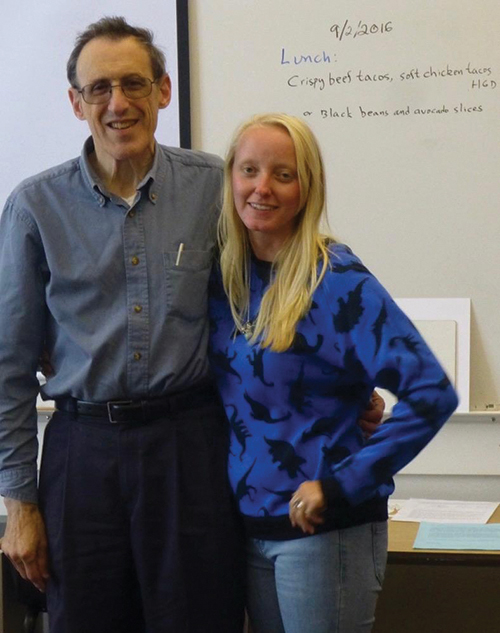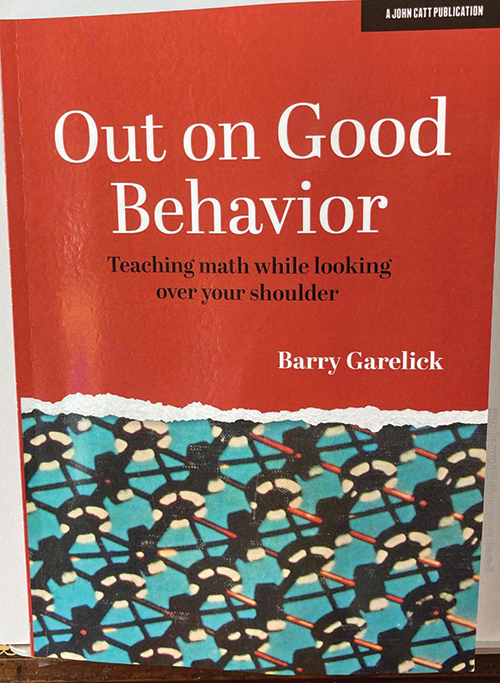
getting through calculus
Math teachers, are you seeking magical methods to help students solve arithmetic brainteasers, algebraic equations, geometry proofs or calculus problems?
Student teachers, are you dreaming of being that teacher students will credit for helping build math skills responsible for launching their career?
Parents, maybe you are as frustrated as Morro Bay’s Barry Garelick was when his daughter Angela was in 2nd grade struggling with math. His college degree was in math, but he was just as confused by the ‘edu-fad’ of the era. An “instructional shift” had replaced the concepts he had learned in school. All he could do was introduce her to methods that had worked for him. It paid off and father and daughter eventually received passing grades.
Garelick beamed, “I got her through calculus.” Today she is thriving in her environmental management career.
Their struggle, however, inspired Garelick to teach math once he retired from his first career with the Environmental Protection Agency (EPA). He worked at two San Luis Obispo County schools while seeking his teaching credential. Tutoring other students with the same issues convinced him to share his everyday teaching experiences and personal insights in several educational publications.

His current book is titled “Out on Good Behavior” (John Catt Educational Ltd. 2021). The memoir takes place during the time he served as a provisional teacher. New teachers are linked with more experienced teachers until they reach tenured status. He affectionately called his mentors ‘parole officers.’ In his introduction he writes, “I have been fortunate enough to work in schools where I’ve been given the autonomy to teach as I wish. I recognize, however, that there are teachers who are not allowed to do so and must conform to mandated practices with which they disagree and that are ineffective. It is to these teachers that this book is especially dedicated.”
Garelick was concerned that many of the math education books on the market or work-shopped during teachers’ professional development seminars were not based on scientific proof. He is a strong advocate for memorization and regular practice. “Memorization helps understanding,” he said. “You have to have something in your head before you understand it.”
For example, practicing a multiplication equation more than seven times becomes “long-term memory” so one doesn’t have to search for the right answer. The acquired knowledge remains ready-to-access when needed and frees up brain-space for new memories.
While working at the EPA he accepted a temporary assignment clerking for an elected representative in Washington D.C. Doing research for him, he discovered major amounts of grant money were being donated to create more educational programs to attract more scientists and engineers.
Garelick said, “(At the time) I was unaware that what I was really seeing was a national crisis in math education.” Traditional teaching methods were being replaced by a cadre of new methods directed exclusively towards students readily equipped for conceptual understanding. The new methods, however, neglected the students who needed to master procedures first.
When told students would “just get it eventually,” Garelick believed many students would need to be shown the process to guide them to the right path to eventually discover how to get to their “aha” moment. Just as the administration believed he would benefit from the teaching experiences of mentor teachers, he believed his students could benefit from examples and practice that helped him and Angela understand math procedures and ultimately concepts.
Garelick’s candid advice for new teachers , or if changing schools: First learn the culture of the school. Be prepared to accept and follow its rules. The goal is to help students learn while building rapport with the administration and staff. If innovation is encouraged, lessons should be based on proven methods. Instruction that helps all students conquer math skills will please their parents and become a win/win/win for all concerned.
Pick up “OuT on Good Behavior” at either Coalesce Book Store in Morro Bay or Volumes of Pleasure in Los Osos.



